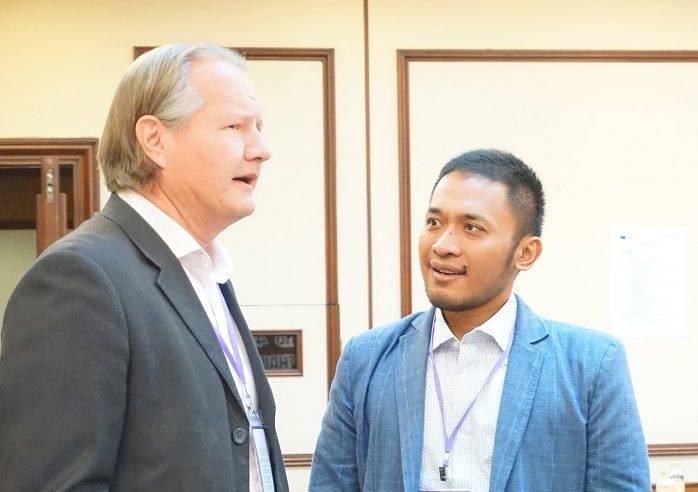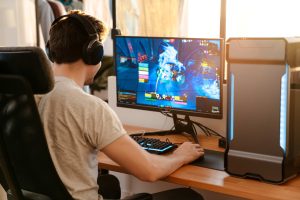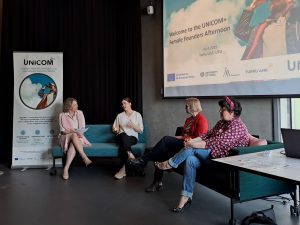Yhä useampi nuori Suomessa kokee yksinäisyyttä, ulkopuolisuutta ja eristäytyneisyyttä. Tähän ongelmaan pyritään puuttumaan NOPPA-hankkeella, jossa osallisuutta lisätään pelillistämisen avulla. …
Tekijät | Authors

Developing sales competences in Indonesia via Sales Program
SEASAC project is co-funded by Erasmus+ programme by the European Union. The main aim of the SEASAC project is to strengthen South-East Asian Universities’ capability to provide highly skilled B2B Sales professionals for the emerging international markets.
The project consortium consists of two Universities from Thailand, five Universities from Indonesia, four Universities from Europe and one governmental organization from Indonesia. SEASAC project is coordinated by the Turku University of Applied Sciences, Finland.
As part of the SEASAC project, Universitas Sebelas Maret Surakarta Indonesia, developed sales program and sales competition to improve students´ sales competence.
Salesperson competence
Competency is a more concrete concept that includes particular knowledge, a single skill or ability, and attitudes. It refers to the quality of being adequately or well qualified, physically and intellectually. There is misuse and/or cross-use of the terms competence and competency. For example, competence is used as a synonym for a performance, a skill, or a personality trait (Griffin, 2007). In contrast, competence is an abstract construct. It describes the quality of being competent. It is the “habitual and judicious use of communication, knowledge, technical skills, clinical reasoning, emotions, values and reflection in daily practice for the benefit of the individual and community being served” (Epstein & Hundert, 2002). Furthermore, salesperson competence can be interpreted as the expertise possessed by salespeople in carrying out sales activities.
Professional competence is more to addressing the upcoming task than to identify competencies
Not only is competence treated as performance, but it is also used indiscriminately to refer to either the observable performance or the underlying neural functions that support the observable behaviour (Trivellasa & Drimoussis, 2013). Furthermore, professional competence is more to addressing the upcoming task than to identify competencies (Griffin, 2007).
The solutions that the sales team offers to serve their clients typically demonstrate their competency. Customers’ confidence in salespeople’s ability to carry out their duties as promised and pay close attention to customer service as a whole is essential. To summarize, competencies can be used to translate business strategies into the development of person- and job-related skills and behaviors that employees can readily comprehend and apply at work.
SEASAC B2B Sales Course and Competition
The sales program developed in Universitas Sebelas Maret Surakarta, Indonesia is a training process that focuses on real results and provides an understanding on step-by-step sales process that has the maximum impact on sales competence development. During the SEASAC project, several sales courses were conducted in UNS, and altogether over 150 students participated in sales courses and local level sales competitions.
The training process is in line with real business situation and the learning outcome of this sales program could be highlight as follow:
- It creates a deeper understanding on the sales cycle, its steps and how to implement it properly.
- It enables students to understand and be able to implement excellent communication techniques that will drive results towards maximum achievement.
- Students are able to create breakthroughs in selling products, services, and solutions.
- Students are able to master ways to increase their emotional intelligence, understanding of others, in order to encourage the achievement of maximum performance
Sales program implements excellent communication techniques that will drive results towards maximum achievement
In the developed sales program, companies are directly involved of in the University-level in Universitas Sebelas Maret, Surakarta, Indonesia, training system in all phases: planning, implementation, and assessment of student performance.
Learning experiences intended from this program are:
- By engaging the understanding of cultural differences and effective communication skills, this program gave students the ability to achieve maximum results for the companies.
- Learned sales skills will be able to develop and improve with experience and learning.
- The students understand the need for preparation and research to avoid mistakes and bottlenecks during sales meetings.
- Selling skills are described as an orientation of a person to try to make improvements and increase the ability and mastery of the work that is his responsibility, based on the situational case analysis.
- The ability of a salesperson in focus on the goal, by carrying out the sales duties is expected to be able to bring the desired results.
Conclusion
The development of core competencies takes time and continuous development. A competence is a bundle of skills rather than a discrete skill. It is this integration of skills that defines a core competency. Because a core competency is the sum of learning across individual skill sets and organisational units, it is unlikely to reside in a single individual or small team. Understanding and developing core competencies is necessary to enable the organisation to exploit the opportunities it provides in this area.
This sales course program has shown a good practice of implementing the flexible education for university students. The student takes control of his own educational career and expects optimal facilitation from the institution, therefore lecturers’ must also renew their job profiles from traditional teachers to real supporters and enhancers of learning. This element was enabled in the SEASAC project by study visit from Indonesia to Europe and by mentoring provided by the European partner universities.
The developed sales program displayed how the set of sales training and competitions conveyed the significance of university graduates being prepared to compete in the global era not just in the academic field, but also in non-academic fields like communication and sales skills. The knowledge gained during education at Universitas Sebelas Maret Surakarta, Indonesia, will be more useful if students are able to sell their works, ideas, services or products to other parties on a larger scale. In addition, this program can also be used to reconstruct learning materials on marketing and sales subjects. This will increase the ability and competence of students in entrepreneurship material as the main content at the university. Learning in international context was started in the SEASAC project in South-East Asian and European Sales Competitions and it will continue also after the SEASAC project, thanks to the cooperation between the SEASAC Secretariat and the European Sales Competition Association.
References
Epstein, R. M., & Hundert, E. M. (2002). Defining and Assessing Professional Competence. Journal of American Medical Association, 287(2).
Griffin, P. (2007). The Comfort of Competence and the Uncertainty of Assessment. Studies in Educational Evolution, Vol. 33(No. 1), 87–99.
Leach, M. P., & Liu, A. H. (2003). Investigating Interrelationships among Sales Training Evaluation Methods. Journal of Personal Selling & Sales Management, 23(4), 327–339. https://doi.org/10.1080/08853134.2003.10749007
Trivellasa, P., & Drimoussis, C. (2013). Investigating Leadership Styles, Behavioural and Managerial Competency Profiles of Successful Project Managers in Greece. Procedia Social and Behavioral Sciences, 73, 692–700.
Artikkeli on osa Myynti ja B2B-liiketoiminta -tutkimusryhmän julkaisuja.








